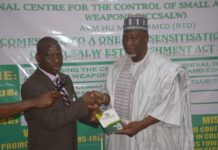Principals of some secondary schools in the FCT on Tuesday commended the FCT Administration for creating gender assemblies in schools.
The assemblies hold separately for boys and girls every Tuesday to talk to girls about Menstrual Hygiene Management (MHM) and to boys on why they should not poke fun at girls whose uniforms got stained with menstrual blood.
School principals who spoke with the News Agency of Nigeria (NAN) said this had improved knowledge and awareness on the part of the girls on how to manage their menstrual cycles effectively and also promoted school attendance and retention.
Mrs Funmilayo Kayode, Principal, Government Secondary School, Wuse Zone 3, said MHM had to do with effective management of girls who had reached puberty and were observing their monthly cycles.
She said MHM messages were communicated through awareness talks during the gender assemblies.
“We have specific teachers that are in charge of gender assemblies for male and female students and they treat different topics throughout the term, thereby doing justice to every chosen topic.
“MHM is one of the major topics that we treat over and over because we discovered that some girls have not started their period; but because we do it constantly, all girls have access to accurate information.’’
The principal noted that some Non-Governmental Organisations also came around to talk and educate girls on how to manage their cycles and also distributed sanitary pads to them regularly.
She said boys were also educated on misconceptions surrounding menstruation to avoid shaming school girls whenever their clothes got stained in the school environment.
“We want to improve talks to both boys and girls concerning this so that even the boys that have access to such information can educate their sisters and other people.
“We have NGOs that come from different places to give talks to female students on MHM.
“In my previous school, one organisation that worked to promote rights of girls in education was told that the boys were complaining that attention was given only to female students.
“And this changed and it started including boys in all programmes. When they were treating MHM, they also treated that topic with boys included.
“This stopped the habit of some boys making jest of girls having their period. Issue of boys laughing when a girl’s clothe is stained was discussed with boys and girls being able to express themselves.
“After that, we discovered that boys are now sympathetic with girls. Some of these girls may get stained and you see boys giving out their sweaters to them to cover up,’’ she said.
The principal listed lateness to school as a major challenge to passing effective communication in schools, saying efforts were on to address the issue.
“I won’t call it a challenge peculiar to menstruation; it’s a general problem now that a lot of students come late to school. Due to COVID-19, assemblies are no longer regular and we still have a lot of information to pass on.
“Most students don’t come to school early, so they miss some information. We are currently trying to address this issue,’’ she added.
Malam Garba Enagi, Principal, Junior Secondary School, Kayarda-Kuje, said MHM provides the ability for women and girls to take care of themselves during menstruation.
According to him, Guidance and Counsellors, Home Economics teachers are used to pass information on MHM to female students.
Enagi said the school also carried out talks frequently during the gender assemblies for boys and girls to gather separately, saying due to COVID-19, Assemblies were not holding as they should.
“The Guidance and Counsellor goes from class to class to educate them on hygiene promotion for MHM.
“As we don’t have assemblies now due to COVID-19, we gather kids in some classrooms and pass the correct message to them,’’ he said.
The principal urged parents to educate their children correctly, saying the era of shyness was over, adding that awareness creation messages were given during PTA meetings also.
Malam Abubakar Yusuf, Principal, Junior Secondary School, Pasali-Kuje, said the school, in collaboration with NGOs, was ensuring awareness creation and sensitising pupils on menstrual health hygiene.
“We are educating young girls to manage their menstruation; some girls in schools mostly lack confidence when they do not have access to pads.
“Some of them also avoid schools because they do not have access to sanitary pads for their menstruation,’’ he noted.
Yusuf, who called on government to pay a special attention to the development of the girl child to prepare her for the future, urged that menstrual education be included in schools curriculum.
The school principal argued that menstrual education is a serious health concern needing attention. (NAN)




